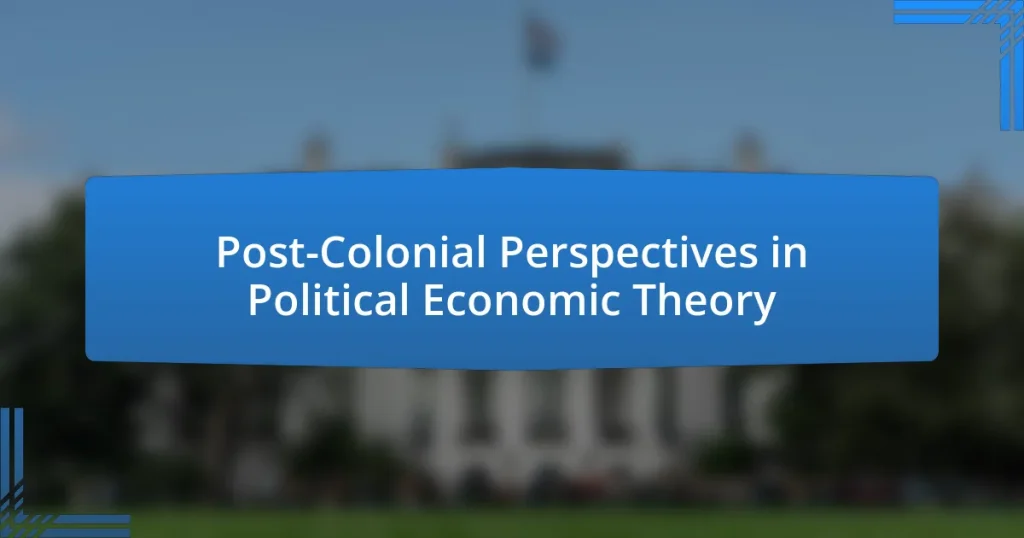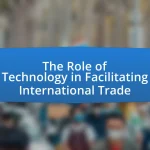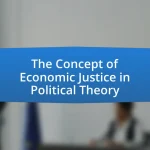Post-Colonial Perspectives in Political Economic Theory analyze the enduring effects of colonialism on economic structures and power dynamics in formerly colonized nations. These perspectives emphasize the historical exploitation and cultural domination that shape contemporary economic inequalities and global trade relationships. Key concepts include hybridity, subalternity, and critiques of Eurocentrism, which challenge traditional economic paradigms by incorporating local contexts and historical legacies. The article discusses how these perspectives inform policy-making, development strategies, and economic practices, highlighting the importance of addressing historical injustices to foster equitable economic systems.
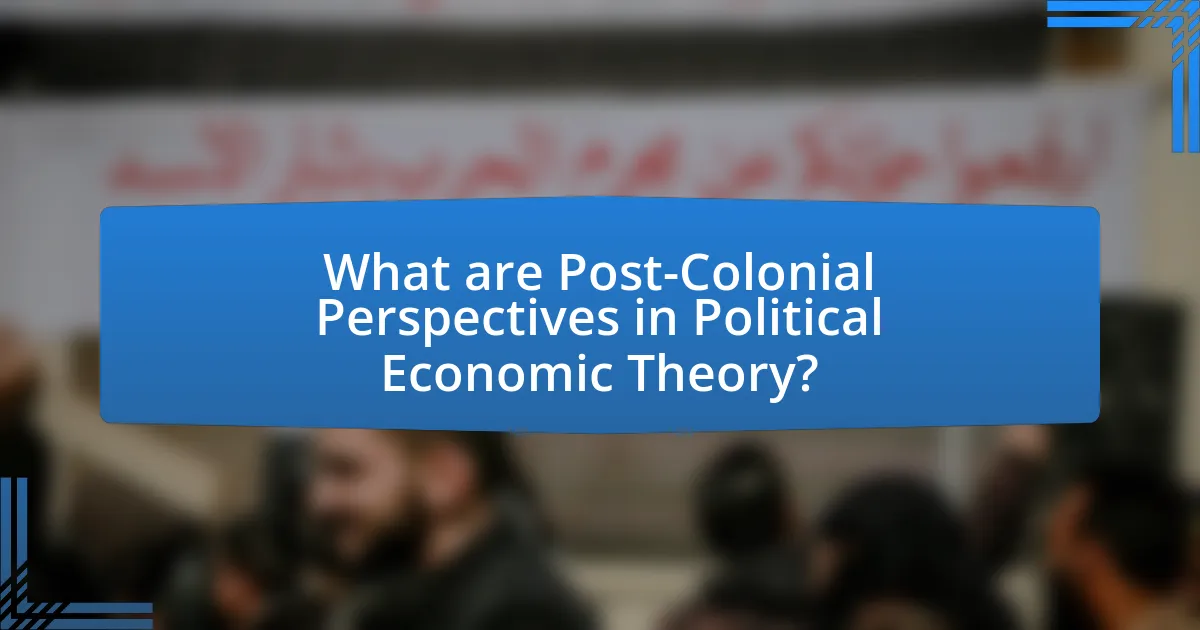
What are Post-Colonial Perspectives in Political Economic Theory?
Post-colonial perspectives in political economic theory examine the lasting impacts of colonialism on economic structures and power dynamics in formerly colonized nations. These perspectives argue that colonial histories shape contemporary economic inequalities and global trade relationships, emphasizing the need to analyze economic systems through the lens of historical exploitation and cultural domination. Scholars like Walter Rodney in “How Europe Underdeveloped Africa” illustrate how colonial practices led to the systematic underdevelopment of African economies, reinforcing the argument that understanding current economic conditions requires acknowledging colonial legacies.
How do Post-Colonial Perspectives differ from traditional Political Economic Theory?
Post-Colonial Perspectives differ from traditional Political Economic Theory primarily in their focus on the impacts of colonialism and the ongoing effects of imperialism on economic structures and social relations. Traditional Political Economic Theory often emphasizes economic systems, class relations, and market dynamics without adequately addressing the historical and cultural contexts shaped by colonialism. In contrast, Post-Colonial Perspectives analyze how colonial histories influence contemporary economic inequalities, power dynamics, and identity politics, highlighting the importance of cultural narratives and local experiences in understanding economic phenomena. This approach is supported by scholars like Edward Said and Gayatri Spivak, who argue that colonial legacies continue to shape global economic relations and social hierarchies, thus necessitating a more nuanced analysis that incorporates these historical dimensions.
What historical contexts shape Post-Colonial Perspectives?
Post-colonial perspectives are shaped by historical contexts such as colonialism, decolonization, and the ongoing impacts of imperialism. Colonialism established power dynamics that marginalized indigenous cultures and economies, leading to social and economic disparities that persist today. The decolonization movements of the mid-20th century, marked by countries gaining independence, further influenced these perspectives by highlighting the struggles against colonial legacies and the quest for identity and autonomy. Additionally, the economic exploitation during colonial rule created structural inequalities that continue to affect former colonies, as evidenced by ongoing debates about reparations and economic justice. These historical contexts provide a framework for understanding the complexities of post-colonial theory and its critiques of global capitalism and cultural hegemony.
How do power dynamics influence Post-Colonial economic theories?
Power dynamics significantly influence Post-Colonial economic theories by shaping the relationships between former colonial powers and colonized nations. These theories often critique the ongoing economic inequalities and exploitative practices that stem from historical colonialism, highlighting how power imbalances perpetuate underdevelopment in post-colonial states. For instance, scholars like Walter Rodney in “How Europe Underdeveloped Africa” argue that colonial exploitation led to structural economic disadvantages that continue to affect these nations. Additionally, post-colonial theorists emphasize the need to deconstruct Western-centric economic models, advocating for frameworks that account for local contexts and power relations, as seen in the works of Amartya Sen and his capability approach, which focuses on individual agency and empowerment in economic development.
Why are Post-Colonial Perspectives important in contemporary political economy?
Post-Colonial Perspectives are important in contemporary political economy because they critically analyze the lasting impacts of colonialism on global economic structures and power dynamics. These perspectives highlight how historical injustices and exploitative practices continue to shape economic inequalities and development trajectories in formerly colonized nations. For instance, scholars like Walter Rodney in “How Europe Underdeveloped Africa” argue that colonial exploitation has led to persistent underdevelopment in African countries, illustrating the relevance of post-colonial analysis in understanding current economic disparities. By incorporating these perspectives, contemporary political economy can better address issues of equity, justice, and the need for inclusive economic policies that acknowledge historical contexts.
What role do Post-Colonial Perspectives play in understanding global inequalities?
Post-Colonial Perspectives are crucial for understanding global inequalities as they highlight the historical and structural factors that perpetuate disparities between nations and communities. These perspectives analyze the lasting impacts of colonialism, such as economic exploitation, cultural domination, and political disenfranchisement, which continue to shape power dynamics and resource distribution today. For instance, post-colonial theorists like Edward Said and Frantz Fanon emphasize how colonial legacies influence contemporary economic policies and social hierarchies, revealing that inequalities are not merely a result of current conditions but are deeply rooted in historical injustices. This understanding allows for a more nuanced analysis of global issues, recognizing that solutions to inequality must address these historical contexts and power imbalances.
How do these perspectives challenge existing economic paradigms?
Post-colonial perspectives challenge existing economic paradigms by critiquing the Eurocentric foundations of traditional economic theories and highlighting the impact of colonial histories on contemporary economic systems. These perspectives argue that mainstream economics often overlooks the socio-political contexts of formerly colonized nations, leading to a misunderstanding of their economic realities. For instance, scholars like Walter Rodney in “How Europe Underdeveloped Africa” illustrate how colonial exploitation has shaped economic underdevelopment, thereby questioning the validity of development models that do not account for historical injustices. This critique prompts a reevaluation of economic policies and practices that perpetuate inequality, advocating for frameworks that incorporate diverse cultural and historical contexts.
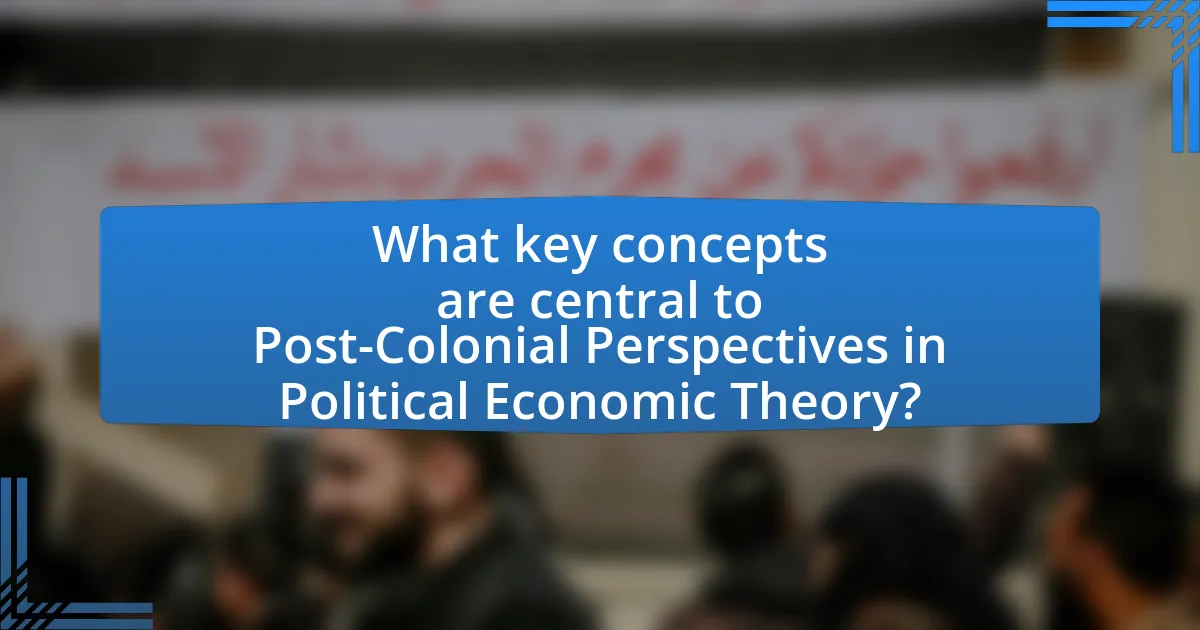
What key concepts are central to Post-Colonial Perspectives in Political Economic Theory?
Key concepts central to Post-Colonial Perspectives in Political Economic Theory include hybridity, subalternity, and the critique of Eurocentrism. Hybridity refers to the blending of cultures and identities resulting from colonial encounters, highlighting the complexity of post-colonial societies. Subalternity addresses the voices and experiences of marginalized groups that are often excluded from dominant narratives, emphasizing the need to understand their perspectives in economic discourse. The critique of Eurocentrism challenges the dominance of Western perspectives in political economy, advocating for the inclusion of diverse viewpoints that reflect the realities of formerly colonized nations. These concepts collectively underscore the importance of context, power dynamics, and historical legacies in shaping economic theories and practices in a post-colonial world.
How does the concept of hybridity apply to Political Economic Theory?
The concept of hybridity applies to Political Economic Theory by illustrating how diverse cultural and economic practices merge to create new forms of governance and economic systems. This blending reflects the complexities of post-colonial societies, where traditional and modern elements coexist, influencing policy-making and economic strategies. For instance, in countries like India, the integration of indigenous practices with global economic models demonstrates hybridity, as seen in the coexistence of local agricultural methods alongside multinational corporate farming. This hybrid approach challenges the binary distinctions of developed and developing economies, emphasizing the need for context-specific solutions that recognize the interplay of local and global forces in shaping economic outcomes.
What examples illustrate hybridity in post-colonial contexts?
Hybridity in post-colonial contexts is illustrated by the cultural blending seen in literature, music, and social practices. For example, the works of authors like Salman Rushdie and Chimamanda Ngozi Adichie showcase the fusion of Western and indigenous narratives, reflecting the complexities of identity in post-colonial societies. Additionally, the musical genre of reggae, which combines African rhythms with Caribbean influences, exemplifies cultural hybridity resulting from colonial histories. These examples demonstrate how post-colonial societies navigate and negotiate their identities through the integration of diverse cultural elements.
How does hybridity affect economic practices in post-colonial societies?
Hybridity significantly influences economic practices in post-colonial societies by blending indigenous and colonial economic systems, leading to unique market dynamics. This fusion often results in the emergence of informal economies that coexist alongside formal structures, as seen in countries like India, where traditional practices integrate with global capitalism. For instance, the coexistence of local artisans and multinational corporations creates a diverse economic landscape, allowing for cultural preservation while also facilitating access to global markets. This duality can enhance resilience against economic shocks, as communities leverage both local knowledge and global trends to navigate challenges.
What is the significance of identity in Post-Colonial Political Economy?
Identity plays a crucial role in Post-Colonial Political Economy as it shapes the socio-economic dynamics and power relations within formerly colonized societies. The significance of identity is evident in how it influences the construction of national narratives, economic policies, and social hierarchies, often reflecting the legacies of colonialism. For instance, the work of scholars like Edward Said in “Orientalism” illustrates how identity is constructed through colonial discourse, impacting economic practices and cultural perceptions. Furthermore, the intersection of identity with class, ethnicity, and gender in post-colonial contexts reveals the complexities of economic inequality and resistance movements, as seen in the writings of Amartya Sen, who emphasizes the importance of identity in understanding development and poverty. Thus, identity is not merely a personal attribute but a fundamental element that informs the political and economic landscape in post-colonial settings.
How do cultural identities influence economic behavior?
Cultural identities significantly influence economic behavior by shaping individuals’ values, preferences, and decision-making processes. For instance, cultural norms dictate consumption patterns, investment choices, and attitudes towards risk, which can vary widely across different cultural groups. Research indicates that collectivist cultures tend to prioritize community welfare over individual gain, leading to different economic behaviors compared to individualistic cultures that emphasize personal achievement. A study by Hofstede (1980) on cultural dimensions highlights how cultural values impact economic activities, showing that societies with high uncertainty avoidance may prefer stable, long-term investments over riskier ventures. This demonstrates that cultural identities are integral to understanding economic behavior in diverse contexts.
What impact does identity politics have on economic policies?
Identity politics significantly influences economic policies by prioritizing the needs and interests of specific social groups, often leading to targeted economic interventions. For instance, policies may be designed to address historical injustices faced by marginalized communities, such as affirmative action in hiring practices or reparations for past discrimination. Research indicates that identity-based movements can reshape fiscal policies, as seen in the implementation of social welfare programs aimed at reducing inequality among racial or ethnic groups. A study by the Institute for Research on Poverty highlights that such policies can lead to increased economic mobility for historically disadvantaged populations, demonstrating the tangible effects of identity politics on economic frameworks.
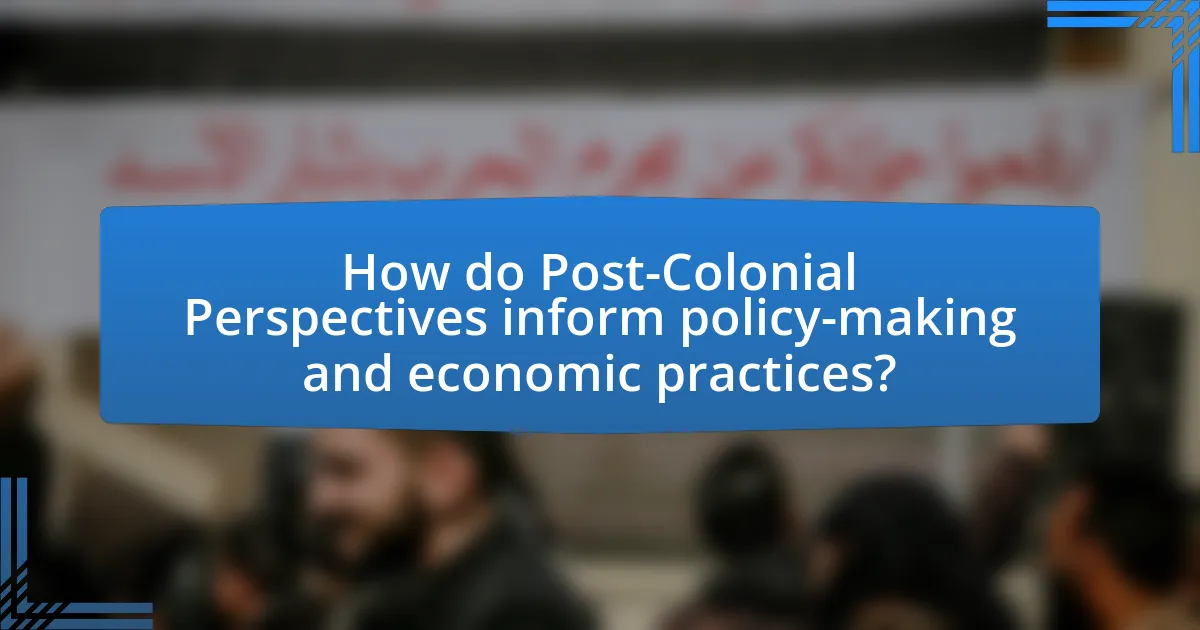
How do Post-Colonial Perspectives inform policy-making and economic practices?
Post-colonial perspectives inform policy-making and economic practices by emphasizing the historical and structural inequalities resulting from colonialism. These perspectives advocate for policies that address social justice, equity, and the empowerment of marginalized communities. For instance, post-colonial theorists argue that economic practices should prioritize local knowledge and resources, as seen in the promotion of indigenous rights and sustainable development initiatives in countries like Bolivia, where the government has implemented policies to protect indigenous land and culture. This approach challenges traditional economic models that often overlook the impacts of colonial legacies, thereby fostering more inclusive and equitable economic systems.
What are the implications of Post-Colonial Perspectives for development policies?
Post-colonial perspectives significantly influence development policies by emphasizing the need for local context and historical awareness in policy formulation. These perspectives critique traditional development models that often impose Western-centric frameworks, advocating instead for approaches that prioritize indigenous knowledge, cultural practices, and local governance structures. For instance, post-colonial theorists argue that development policies should address the legacies of colonialism, such as economic dependency and social inequalities, which continue to affect former colonies. This approach is supported by research indicating that development initiatives that incorporate local perspectives tend to be more effective and sustainable, as evidenced by case studies in countries like India and Ghana, where community-driven development has led to improved outcomes.
How can Post-Colonial theories reshape international aid strategies?
Post-Colonial theories can reshape international aid strategies by emphasizing the importance of local agency and cultural context in development initiatives. These theories critique traditional aid models that often impose Western values and solutions, advocating instead for approaches that prioritize the voices and needs of the recipient communities. For instance, the work of scholars like Edward Said and Gayatri Spivak highlights the necessity of understanding historical power dynamics and the socio-political realities of post-colonial nations. By integrating these perspectives, international aid can become more equitable and effective, fostering sustainable development that aligns with local priorities rather than external agendas.
What lessons can be learned from Post-Colonial critiques of development?
Post-Colonial critiques of development teach that development is often a continuation of colonial power dynamics, emphasizing the need for local agency and context-specific solutions. These critiques highlight that traditional development models frequently impose Western values and ignore indigenous knowledge systems, leading to ineffective or harmful outcomes. For instance, the work of scholars like Edward Said and Gayatri Spivak illustrates how development narratives can marginalize local voices and perpetuate inequalities. Additionally, critiques reveal the importance of understanding historical contexts and power relations, as seen in the analysis of the World Bank and IMF policies that often prioritize economic growth over social equity. This understanding encourages a more inclusive approach to development that respects cultural identities and promotes sustainable practices.
How can practitioners apply Post-Colonial Perspectives in their work?
Practitioners can apply Post-Colonial Perspectives in their work by critically analyzing the historical and ongoing impacts of colonialism on economic systems and social structures. This involves incorporating indigenous knowledge and voices into economic policies, recognizing the power dynamics that shape global trade, and advocating for equitable resource distribution. For instance, scholars like Walter Mignolo emphasize the importance of decolonizing knowledge production, which can guide practitioners in creating frameworks that challenge Eurocentric models. By doing so, they can foster inclusive economic practices that address the legacies of colonial exploitation and promote social justice.
What strategies can be employed to integrate Post-Colonial insights into economic analysis?
To integrate Post-Colonial insights into economic analysis, scholars can employ strategies such as deconstructing traditional economic models, incorporating indigenous knowledge systems, and emphasizing the historical context of colonialism in economic development. Deconstructing traditional models allows for the critique of Eurocentric perspectives that often dominate economic theory, revealing biases and assumptions that may not apply universally. Incorporating indigenous knowledge systems acknowledges the value of local practices and perspectives, which can lead to more inclusive and relevant economic policies. Emphasizing the historical context of colonialism highlights how past injustices and exploitative practices continue to shape contemporary economic realities, thereby informing more equitable economic frameworks. These strategies collectively enhance the understanding of economic phenomena through a Post-Colonial lens, fostering a more nuanced and comprehensive analysis.
How can organizations benefit from adopting Post-Colonial frameworks?
Organizations can benefit from adopting Post-Colonial frameworks by enhancing their understanding of global power dynamics and cultural contexts. This approach allows organizations to critically analyze historical injustices and their ongoing impacts, leading to more equitable practices and policies. For instance, by recognizing the legacies of colonialism, organizations can develop strategies that promote inclusivity and diversity, which can improve employee morale and customer relations. Research indicates that organizations embracing diverse perspectives often experience increased innovation and market competitiveness, as seen in studies by the McKinsey Global Institute, which found that companies in the top quartile for ethnic and racial diversity are 35% more likely to outperform their peers in profitability. Thus, adopting Post-Colonial frameworks not only fosters social responsibility but also drives economic success.
What are best practices for engaging with Post-Colonial Perspectives in Political Economic Theory?
Best practices for engaging with Post-Colonial Perspectives in Political Economic Theory include integrating diverse voices from formerly colonized regions, critically analyzing the historical context of colonialism, and applying intersectional frameworks to understand the complexities of power dynamics. Engaging with scholars such as Dipesh Chakrabarty and Arundhati Roy can provide insights into how colonial legacies shape contemporary economic structures. Additionally, utilizing case studies from post-colonial nations can illustrate the ongoing impacts of colonialism on economic policies and practices, reinforcing the necessity of a nuanced approach that acknowledges historical injustices and promotes equitable solutions.
